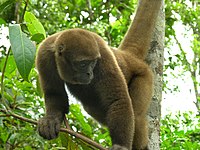
Photo from wikipedia
OBJECTIVES Parasite selection pressures have driven the evolution of numerous behavioral defenses in host species, but recent studies revealed individual variation in their expression. As little is known about the… Click to show full abstract
OBJECTIVES Parasite selection pressures have driven the evolution of numerous behavioral defenses in host species, but recent studies revealed individual variation in their expression. As little is known about the factors causing heterogeneity among individuals in infection-avoidance behaviors, we investigated in woolly monkeys (Lagothrix lagotricha poeppigii) the influence of several environmental and individual characteristics on the tendency to avoid food contaminated by soil and by their own and conspecifics' feces. MATERIALS AND METHODS We conducted feeding tests on 40 semi-free ranging individuals rescued from the pet trade. Using generalized linear mixed models, we investigated the effect of season, sex, age, dominance rank, and exposure to non-natural living conditions on feeding decisions. RESULTS Woolly monkeys did not avoid soil-contaminated food and equally avoided food contaminated by their own and conspecifics' feces. Individuals varied greatly in their level of fecal avoidance. Only females exhibited strong avoidance of fecally contaminated food, but adapted their behavior to food availability, highlighting the trade-off between nutritional intake and parasite avoidance. Additionally, low-ranking females, less competitive over food resources, exhibited lower avoidance than dominant ones. Juveniles were more cautious than adults, possibly to compensate for a higher parasite susceptibility. Finally, we reported an unknown effect of exposure to non-natural living conditions on behavioral defenses, as animals kept as household pets for an extended period apparently lost their ability to avoid fecally contaminated food. CONCLUSION We argue that striving to understand variation in infection-avoidance behaviors in natural populations is crucial to predict disease spread and inform conservation policies.
Journal Title: American journal of physical anthropology
Year Published: 2021
Link to full text (if available)
Share on Social Media: Sign Up to like & get
recommendations!